- Home
- Paullina Simons
Six Days in Leningrad Page 22
Six Days in Leningrad Read online
Page 22
“Paullina, where are you going?” my father called after me.
“Giving you some privacy, Papa.”
“Come back.”
I came back.
“Papa, I read somewhere that there is no word in Russian for privacy. Is that true?”
He frowned. “Let me think about it,” he said. “I’ll tell you in a minute.”
In a minute, he said, “There is a word for private property.”
“No, Papa. I want a word for privacy. As in I’ll give you some privacy.”
Clearing his throat, he said, “No, I can’t think of it. I guess there isn’t.”
“I understand,” I said. “Suddenly I understand everything.”
As we walked to the beach, Viktor said, “You mustn’t feel bad about the woods. The woods are often the best place to go. Clean, hygienic.”
Yeah, I wanted to say, with 150 million people using the woods as one large unprivate public toilet, very clean and hygienic.
My father and Viktor had a swim in Lake Ladoga. The day was blazingly sunny, and almost warm, 63°F — as warm as a sunny winter’s day in Texas. I touched the water gingerly with the tip of my big toe. It was cold. Standing up to his torso in the water, my father called out, “Paullina, what a shame you didn’t bring your bathing suit!”
“Yes, isn’t it just,” I said, taking the tip of my big toe out of the water.
I went back to the car, sat on a rock and leafed through one of the books on the blockade I had bought at the diorama.
Two hundred and forty thousand dead at Nevsky Patch, a place the rest of the world has never heard of.
The memorial there reads:
You the living — Know this!
We didn’t want to leave this land,
And we didn’t.
We stood to the death on the banks of the dark Neva,
We died so you could live.
Viktor and Papa came back and dried off. At the market, Viktor had very smartly bought a plastic picnic set that came with a little plastic picnic rug, which we now laid out on the ground next to the car. Problem was, it kept blowing away. So we put the bologna and the tomatoes on it to hold it down. Then we put our shoes on it. Then there was nowhere left for us to sit.
My father stood. I sat on my rock. Viktor squeezed in between the shoes and the bologna. Getting out his replica Swiss Army knife, he attempted to cut the tomatoes. Instantly I saw why his knife had cost sixteen cents. He may as well have been cutting the tomatoes with a spoon. First the juice started pouring out. Then the seeds. Then only the tomato skin was left in his hands, intact except for the gouges.
“Viktor, the knife is no good,” my father said.
“What do you expect for a ruble?”
“Here, Viktor, let me,” I said, fishing around in my purse. I took out my small bought-in-America Swiss Army knife, which cost ten bucks and was actually made in Switzerland. The knife effortlessly cut a tomato into paper-thin slices and then cut some neat squares of pumpernickel bread. Those Swiss. They were busy designing a perfect utility knife while the rest of the world was making and using automatic rifles.
We ate. My father and Viktor drank the kvas.
“Plinka, do you want some?” my father asked.
“No thanks,” I said. “I’d rather have my bread in a sandwich.”
Besides, I had learned the hard way: liquid in, liquid out. I wasn’t going to drink another sip of anything until my flight home on Sunday.
We talked in more detail and at further length about the real estate possibilities of Lake Ladoga, the largest lake in Europe and the least inhabited. So what if it was covered with a sheet of ice two solid meters deep for eight months of the year? That didn’t matter. This was the tourist attraction of the twenty-first century, according to my father and Viktor.
I wasn’t paying attention to them. I was thinking of Schlisselburg, of Nevsky Patch.
The diorama of Schlisselburg, January 1943, Operation Spark, to show the breaking of the German blockade around Leningrad.
On the way back, my father slept. I was silent. All I could think about was the blue Neva ice at dawn, of losing 115,000 men in six days, of two square kilometers flooding with Russian blood.
As we passed Schlisselburg, I leaned forward and whispered, “Viktor, how about if you drive on, to Nevsky Patch?”
“Oh, Paullina,” said Viktor. “Your father will kill me.”
“He’ll never know,” I said. “He’ll be asleep until Grand Hotel Europe. We’ll be quick. Fifteen minutes.”
“But it’s an hour or more out of our way.”
“So?”
“Your father will wake up.”
“Trust me, he won’t.”
“He will wake up at the hotel and wonder why it is eight o’clock instead of six.”
“Tell him we were stuck in traffic.”
“Oh, Paullina. What traffic?” There was no one on the road.
I imagined walking through a land of bones and bullets on which nothing grew. I leaned back. I closed my eyes.
When I opened them again, we were at Grand Hotel Europe.
SPEAK SOFTLY LOVE
My father showered in my room.
I phoned home and talked to my three-year-old Misha — finally! Poor boy. It had been five days.
He began with, “I’m so happy, Mommy.” So happy he finally got me on the phone.
Afterward, while my father was getting dressed, I went for a walk around the hotel. I found the clothing boutique and looked for a black dress. I would have bought it had I been going inside the cathedral for tomorrow’s funeral.
All I can say is thank God for President Yeltsin. The only wearable dress cost three hundred and seventy-five units, and it wasn’t black.
Without our coats, because it was a sweet warm evening, we walked five minutes to Dom Knigi — House of Books — Leningrad’s most celebrated bookstore, located in the shabby splendor of a green and gray Art Nouveau masterpiece of a building, glorious but desperately in need of restoration. My father was not talkative and told me he would wait for me on the street.
“Hurry up,” he said, leaning against the historic gray granite and lighting a cigarette.
There are a few fundamental skills one needs to run a successful bookstore. One is a loose knowledge of alphabetization and some of its practical applications.
Dom Knigi disagreed.
Perhaps they had some other system of classification of books that I was not aware of.
“I’m looking for books about the blockade,” I said to the clerk.
A young, bleached-blonde, sloppy-looking girl stared at me wanly and spoke only when she was good and ready.
“The blockade? Berlin?”
“Um, I was thinking of Leningrad.”
“Oh.” Silence. Then, “Did you try upstairs?”
“No.”
“Try upstairs.”
“Thanks,” I said. “What about maps?”
“Maps of the blockade?”
“No. Just generally of this region.”
She sighed. “Try upstairs.”
Upstairs was run-down, unfriendly, and had no maps. There was no one at the service desk, and I had to wait five minutes before I could ask where they were hiding their history section. The man pointed me to the front window, where I found five shelves of books in no discernible order. I went back to the desk, and after waiting for him five more minutes asked where I could find books on the Leningrad blockade.
“Leningrad? What are you doing upstairs?”
“Well —”
“They’re downstairs, of course, in the World War II section. Just look through there. You’ll find what you need.”
I left the store.
On the street my father looked cranky and hungry. He was having a little trouble walking.
“I just need to pick up my photos,” I said to him. “It’s not far.”
“I’m going to wait for you right here,” he said, settling into a
stone bench beneath a lone tree on Griboyedov Canal.
“Are you okay?” I asked.
“We haven’t eaten,” he said. “I’m not feeling very well. I’m a little dizzy — it’s just my diabetes. Go get your pictures. But hurry, I want to eat.”
I ran to get my silly photos from the Kodak store, so my poor diabetic father wouldn’t have to wait too long before we ate.
We had dinner at Sankt Peterburg, a Russian restaurant on Griboyedov Canal, next to Spas Na Krovi. A lifetime ago on Monday, my father had promised me we would see this church again, and here we were, casting it a passing glance as we made our way down the steps of a darkened restaurant.
I had exquisite black caviar with blini, excellent pelmeni and substandard chocolate mousse. My father had solyanka, a thick meat soup, and pelmeni.
He said he didn’t want any dessert but then polished off my mousse.
Since the tap water in all of Leningrad was undrinkable, I was forced to buy a tiny bottle of Evian, which at thirty rubles was twice as expensive as my father’s giant glass of beer, which he drank down to chase down his similarly low-priced double shot of vodka.
He was tired at first, but after a bit of food and drink he brightened. We talked about his retirement.
“Papa,” I said, “there are two things you love: fishing and gardening. Where are you going to grow your tomatoes on Maui? How are you going to sit in your boat?” He couldn’t have a boat on the ocean; too dangerous and unfamiliar, and he was too old to learn.
“What boat? What tomatoes?”
“Exactly.”
My father mentioned something about fishing off a pier. I remained unconvinced. “Are you really going to stand on a pier? Are you going to stand in two feet of water?”
“If I have to.”
“It’s not the same as sitting in a boat.”
“No,” he said. “But the sun sets on the ocean; do you know what that’s like?”
“No,” I said sadly. I knew only the Atlantic with its sunrise-facing shores.
“Well, it’s quite a sight. Besides, you are wrong. I love three things. Yes, fishing and gardening. But the third one is your mother. Maui is the perfect place for her, so I will be happy there, too. I can be happy anywhere.”
I thought. “You also love the Yankees.”
“What, they don’t have television on Maui?”
“You won’t be able to watch the games live.” Hawaii was on tape delay for sports coverage because of prime time.
“I’ll tape them. It’ll be fine.”
“You also love movies.”
“Yes.”
“Instead of gardening or fishing, you can watch The Godfather with Mama over and over.”
He smiled. “What a splendid life.” The Godfather is my father’s favorite film.
We ate, we drank. I wished it weren’t so smoky. My eyes were burning.
“Are you scared, retiring? You’ve worked your whole life. You love your job.”
“I have worked my whole life,” my father said. “And I do love my job. There are very few people in the world who can do what I do.” Perhaps if he had done his job less well, Communism would still be flourishing in the Soviet Union and he would still be in New York, and my mother wouldn’t be sick in her soul.
He shook his head, took another gulp of beer. “Paullina, it’s time for me to leave work. I don’t feel well. I do not live a healthy life. I don’t. And also, your mother.” He fell quiet.
“I’m leaving for her,” he said when he spoke again. “She needs me to stop working, she needs me to be with her, to take care of her. I’m going to do that. I want us to have a good life.”
“You will, Papa,” I said.
“We’re going to get up at seven each morning,” he said, “and we’re going to go to the beach. We will walk, swim, sit, talk. Then we’ll come home and have breakfast.”
“By the time you’re done with all that, it’ll be time for lunch.”
“Then we’ll have lunch. After lunch a nap, and maybe a little internet.”
“Good plan,” I said. The red dust went unmentioned.
“We’ll walk back to the beach in the late afternoon. Then dinner. Then movies. It’s a splendid life, isn’t it?”
I agreed that it was.
“And any time we want to, we can hop on a plane and in three hours be in San Francisco. We’ll rent a car, we’ll drive down to see you and the kids in Texas, we’ll drive to New York, visit Liza, Dedushka, Babushka. We’ll travel. Mama will see Las Vegas finally. That’s her dream. Paullina, I want to give her that.”
“I know.”
“You and the children and Kevin of course can come and visit us any time. Any time. For as long as you want. You have a place to stay. With us.”
“Papa, you have a two-bedroom condo!”
“We’ll fit.”
“Papa, the indirect flight to Maui is thirteen hours from Dallas. What are we going to do with my kids on the plane for thirteen hours?”
He paused. “It’s not thirteen straight hours. You change in San Francisco or Honolulu.”
It was time for me to shake my head.
“Paullina, you don’t know Hawaii. You cannot imagine. You won’t want to leave.” He smiled. “It’s not like here.”
Then why didn’t I want to leave here?
“Yes, I hear it’s paradise on earth,” I said. I sipped my water. He drank his beer. “There, not here,” I added, in case there was any confusion.
We were quiet for a while. Finally I said, changing the subject, “So, I guess I’m not calling Yulia, huh, Papa?”
“Do what you like,” he said. “It’s going to be very difficult for you to see her.” Difficult for me or difficult for him?
He seemed so reluctant to share our time together with other people besides the minimum he was obligated to deliver. No Alla for breakfast, no Anatoly and Ellie for dinner, no walking with Anatoly through the streets of Leningrad. No Yulia. Just me and my father.
Well, he did put off his retirement to paradise to come to Leningrad with me. It was only right.
“What did you think of Schlisselburg?” he asked. “You don’t need any more inspiration, do you?”
I shook my head. It was all I needed. It was everything.
He drank his beer.
“But you know,” I said, “one of the things that affected me most —” I broke off. I found it hard to continue. I had started well enough, couched myself in euphemism — the thing, affected me, so banal, so bland — but then an image sprung up, an image of the ground on which nothing grows. We died so you could live. Darkest Neva rose up, and tears too. This is ridiculous, I thought, and tried again, more slowly. “You know, the thing I want to say, is this . . .” Trailing off, I looked into my tea.
“What?” my father said, trying to understand. “What’s the matter with you?”
My head twitched as I tried to compose at least my voice.
“It’s those two hundred and forty thousand men at Nevsky Patch,” I said, still staring into my tea, not looking at my father. “What did they die for?”
My father shrugged. “What does anybody die for? It’s war, Paullina. Young boys go to die. That’s what war is.”
He wasn’t understanding me. What did they die for?
I tried again. “Yes, but we’ve all heard of Iwo Jima, we’ve heard of Omaha Beach.” And yet that wasn’t it. That wasn’t the heart of it. “But no one has heard of Nevsky Patch. No one’s heard of Schlisselburg.” All true, but that still wasn’t the thing that hurt. It was the enormity of the sacrifice balanced against the reality of the present life that hurt the most. They didn’t balance each other out. The scales were upended.
A show began in the restaurant. Elaborately dressed traditional dancers cavorted to loud Russian muzak. I kept waiting to hear “Shine, Shine, My Star,” but no such luck. It was too loud for us to talk, so we asked for the check.
The Russian waiter, although polite, could not fo
r the life of him say “You’re welcome” when we thanked him for bringing us food or drink. When we tipped him generously, he didn’t say thank you, but he did ask us to come back soon.
On the way out, I stopped at the gift shop to get some matryoshkas — the famous wooden nesting dolls — for my children while my father went outside to smoke. He had smoked all through the meal, exhaling the fumes into my face. He didn’t give it a second thought, and why should he? That had been his life and mine, too, in cramped, less well ventilated rooms. I’ve never said a word and never could.
I must have spent ten minutes choosing my nesting dolls. When I glanced outside to make sure he wasn’t getting too antsy, there was my funny dad, leaning on a railing above Griboyedov Canal, chatting happily to a young dark-haired man. The Church on Spilt Blood framed them. The man was leaning close, energetically explaining something, and my father was listening intently.
Suddenly my father came back inside and motioned for me. In the golden glimmer of the evening I saw that the young man was drunk.
“This is my daughter,” my father said, smiling proudly. As if he were introducing me to his good friend.
The man shook my hand; rather, he grabbed my hand and held it. I pulled away. My father said to him, “Come, I will buy you some water.”
I glared at my dad, but he wouldn’t give me the satisfaction of meeting my eyes, so we started to walk along the Griboyedov, the drunk man close behind us. He never for an instant stopped talking. He kept reciting obscure Boris Pasternak poetry:
Under willow trees with ivy ingrown
We are trying to hide from bad weather.
I am clasping your arms in my own,
In one cloak we are huddled together.
I was wrong.
Not with ivy-leaves bound,
But with hops overgrown is the willow.
Well then, let us spread out on the ground
This our cloak as a sheet and a pillow.
A few hundred feet down the canal, my father bought the drunken poet an Evian. The man promptly offered to share it with my dad, who promptly refused. We started to walk again. The man continued to zigzag beside us, quoting Pasternak all the while. It took me two more blocks to realize he was repeating the same poem over and over, about sitting down and drinking from the common cup. But when he expressed contemptuous distaste for the saxophonist playing by the canal, heckling him loudly, even my father had had enough. My father was partial to saxophonists. Earlier, he had given the same musician twenty rubles for a Russian jazz rendition of “You Ain’t Nothin’ but a Hound Dog.”

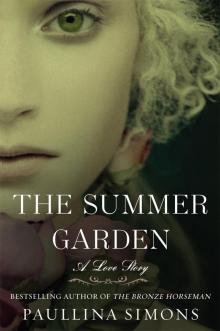 The Summer Garden
The Summer Garden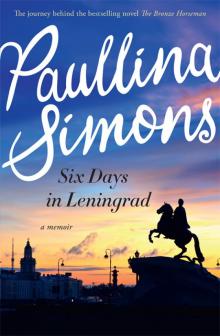 Six Days in Leningrad
Six Days in Leningrad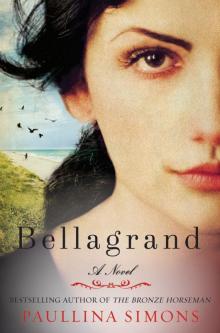 Bellagrand
Bellagrand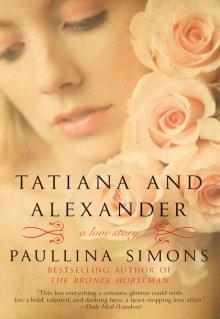 Tatiana and Alexander
Tatiana and Alexander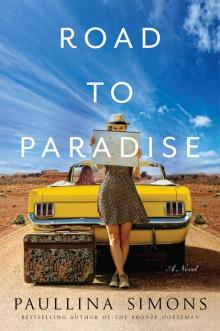 Road to Paradise
Road to Paradise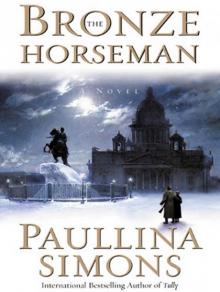 The Bronze Horseman
The Bronze Horseman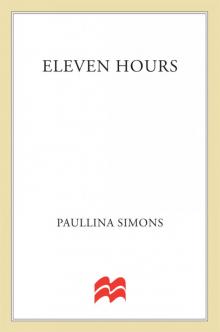 Eleven Hours
Eleven Hours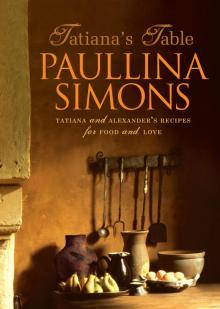 Tatiana's Table: Tatiana and Alexander's Life of Food and Love
Tatiana's Table: Tatiana and Alexander's Life of Food and Love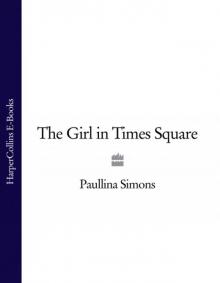 The Girl in Times Square
The Girl in Times Square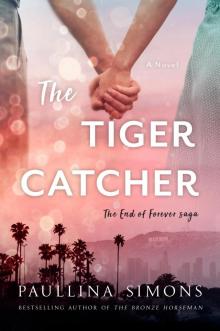 The Tiger Catcher
The Tiger Catcher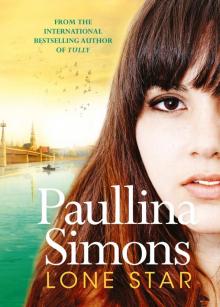 Lone Star
Lone Star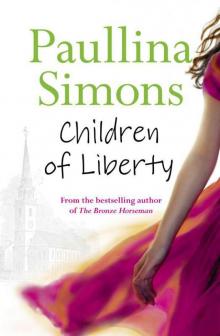 Children of Liberty
Children of Liberty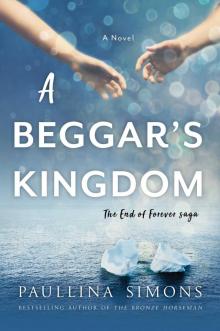 A Beggar's Kingdom
A Beggar's Kingdom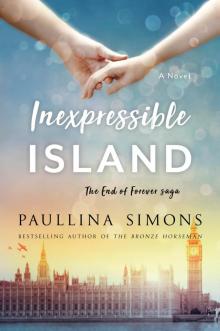 Inexpressible Island
Inexpressible Island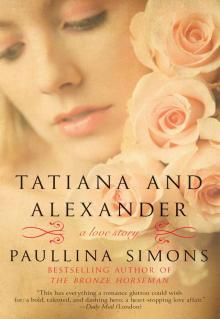 Tatiana and Alexander: A Novel
Tatiana and Alexander: A Novel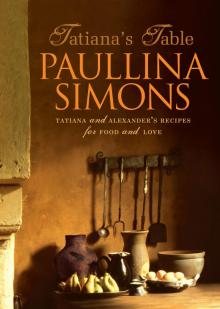 Tatiana's Table
Tatiana's Table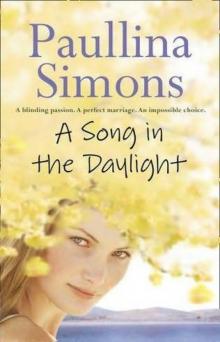 A Song in the Daylight (2009)
A Song in the Daylight (2009)